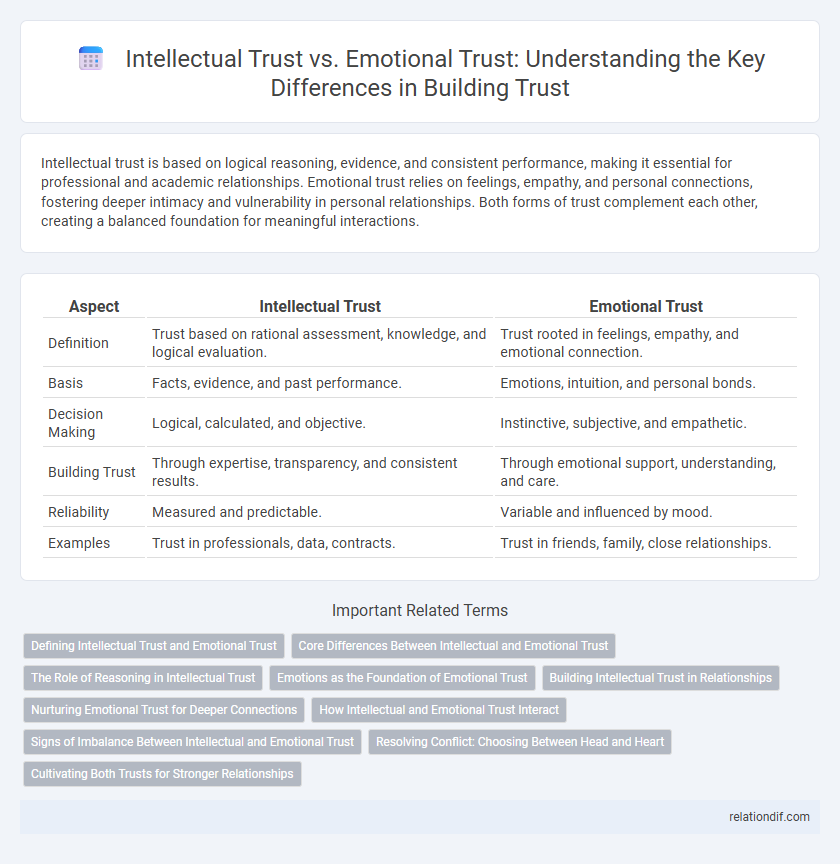Intellectual trust is based on logical reasoning, evidence, and consistent performance, making it essential for professional and academic relationships. Emotional trust relies on feelings, empathy, and personal connections, fostering deeper intimacy and vulnerability in personal relationships. Both forms of trust complement each other, creating a balanced foundation for meaningful interactions.
Table of Comparison
| Aspect | Intellectual Trust | Emotional Trust |
|---|---|---|
| Definition | Trust based on rational assessment, knowledge, and logical evaluation. | Trust rooted in feelings, empathy, and emotional connection. |
| Basis | Facts, evidence, and past performance. | Emotions, intuition, and personal bonds. |
| Decision Making | Logical, calculated, and objective. | Instinctive, subjective, and empathetic. |
| Building Trust | Through expertise, transparency, and consistent results. | Through emotional support, understanding, and care. |
| Reliability | Measured and predictable. | Variable and influenced by mood. |
| Examples | Trust in professionals, data, contracts. | Trust in friends, family, close relationships. |
Defining Intellectual Trust and Emotional Trust
Intellectual trust is the confidence based on rational assessment, evidence, and logical evaluation of a person's competence or reliability. Emotional trust arises from feelings, personal connection, and empathy, often built through shared experiences and emotional bonds. Both forms of trust play critical roles in relationships, influencing decision-making and interpersonal dynamics differently.
Core Differences Between Intellectual and Emotional Trust
Intellectual trust is based on rational evaluation, facts, and evidence, relying on consistent behavior and logical reliability, while emotional trust stems from feelings, empathy, and personal connections, reflecting emotional bonds and vulnerability. Core differences lie in their foundation: intellectual trust depends on cognitive judgment and information, whereas emotional trust builds on emotional resonance and shared experiences. Understanding these distinctions helps in developing balanced relationships that combine reasoned assurance with heartfelt confidence.
The Role of Reasoning in Intellectual Trust
Intellectual trust is anchored in reasoning, evidence, and logical evaluation, distinguishing it from emotional trust which relies on feelings and personal bonds. The role of reasoning in intellectual trust involves critical analysis of information, assessing credibility, and verifying facts to build confidence in knowledge or expertise. This form of trust enhances rational decision-making by prioritizing objective validation over subjective impressions.
Emotions as the Foundation of Emotional Trust
Emotional trust is rooted in the stability and authenticity of feelings, where consistent empathy and genuine care foster deep connections. Unlike intellectual trust, which relies on logical assessment and evidence, emotional trust depends on the shared experience of emotions that create psychological safety. Neurobiological studies highlight that emotional bonding triggers oxytocin release, reinforcing trust through affective resonance and interpersonal attunement.
Building Intellectual Trust in Relationships
Building intellectual trust in relationships requires consistently demonstrating competence, reliability, and honesty in communication and actions. Providing accurate information, acknowledging mistakes, and delivering on promises reinforce confidence in one's knowledge and decision-making abilities. This form of trust establishes a strong foundation for collaborative problem-solving and long-term partnership success.
Nurturing Emotional Trust for Deeper Connections
Nurturing emotional trust fosters deeper connections by creating a safe space for vulnerability and authentic communication. Unlike intellectual trust, which is based on logic and factual reliability, emotional trust thrives on empathy, consistency, and emotional responsiveness. Building emotional trust strengthens relationships through genuine understanding and mutual support, enhancing long-term interpersonal bonds.
How Intellectual and Emotional Trust Interact
Intellectual trust, based on rational judgment and evidence, forms the foundation for decision-making and reliability in relationships. Emotional trust, rooted in feelings and empathy, strengthens bonds by creating a sense of safety and connection. When intellectual and emotional trust interact, they create a comprehensive trust ecosystem where logical confidence supports emotional security, enhancing overall trustworthiness and fostering deeper interpersonal relationships.
Signs of Imbalance Between Intellectual and Emotional Trust
Signs of imbalance between intellectual and emotional trust often manifest as skepticism or emotional withdrawal despite logical assurance. When intellectual trust is high but emotional trust is low, individuals may question facts or motives even when evidence is sound. Conversely, strong emotional trust combined with weak intellectual trust can lead to blind faith or ignoring critical information, increasing vulnerability to deception.
Resolving Conflict: Choosing Between Head and Heart
Resolving conflict requires balancing intellectual trust, rooted in rational judgment and evidence, with emotional trust, based on feelings and relational bonds. Relying on intellectual trust helps analyze situations objectively and establish fair solutions, while emotional trust fosters empathy and strengthens interpersonal connections during disagreements. Effective conflict resolution often involves integrating logical reasoning with emotional understanding to build lasting, trustworthy relationships.
Cultivating Both Trusts for Stronger Relationships
Intellectual trust is built on competence, reliability, and proven expertise, while emotional trust stems from empathy, vulnerability, and genuine care. Cultivating both intellectual and emotional trust strengthens relationships by fostering confidence in abilities alongside a deep sense of connection and understanding. Balancing these trusts creates a resilient foundation that supports collaboration, loyalty, and long-term commitment.
Intellectual Trust vs Emotional Trust Infographic

 relationdif.com
relationdif.com